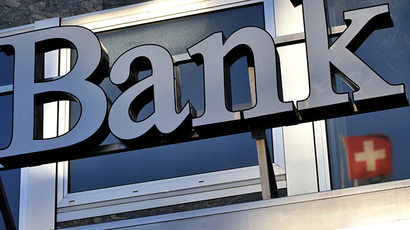Swiss clocks tick past banks’ deadline to disclose hidden assets to US
Some 300 Swiss banks had until the end of Monday to determine whether to give the United States records of Americans hiding assets there as Washington threatens institutions with legal action for assisting those avoiding US taxes.
The US and Switzerland have been at odds in recent years, with
Washington alleging that Swiss banks have helped US citizens hide
billions of dollars in assets from authorities.
Pursuant to a deal between the nations, Swiss banks can avoid US
prosecution by volunteering account information on American
clients, along with paying a fine.
The penalty equals between 20 and 50 percent of the value of the
undeclared accounts, based on when they were conceived. If a bank
opened an undeclared account before 2009 - when the Swiss banking
giant UBS was fined US$780 million by the US for tax evasion - it
would face a lower penalty.
Notoriously secretive Swiss banks that do not disclose account
information will face stiffer penalties and prosecution in the US
if Washington finds they have hidden Americans’ assets.
Egon Vorfeld, managing partner at the Forum Finance Group SA,
suggested smaller banking entities will feel the brunt of the
high fines even though they are less likely to hide US citizen
assets.
“Most of the larger banks are already cooperating, and it’s
fairly clear which direction they are going,” Vorfeld told
RT in an interview. “They have run the numbers and know
exactly what they are doing. Perhaps some of the smaller banks
could be affected because the fines - the worst of them - could
be very onerous on them.”
Negotiator of the deal Swiss Finance Minister Eveline
Widmer-Schlumpf has encouraged banks to comply, but experts are
split on whether bending to Washington and offering disclosure is
a good idea.
"If the United States is threatening all the Swiss banks that
it will block their access to the US market and to conducting
operations in dollars, let it say so clearly, and let Switzerland
take the country before…the World Trade Organization for abusing
its dominant position," wrote business lawyer Douglas
Hornung in a recent opinion piece in the Le Temps daily.
"But please, don't give in to inexcusable blackmail and let
us remain the proud masters of our destiny, and of our past. We
have a choice," he added.
Vorfeld told RT the issue of why the US feels it should be able
to tell Swiss banks what to do comes down to its large footprint
in global banking operations.
“The US has an awful lot of clout and is able to throw its
weight around, and feels justified to do so. But clearly a lot of
other people feel there is injustice in this supposed justice
system, that a lot of the smaller banks will be possibly
victims,” Vorfeld said, suggesting those smaller
institutions are also more likely to possibly evade the US
demand.














